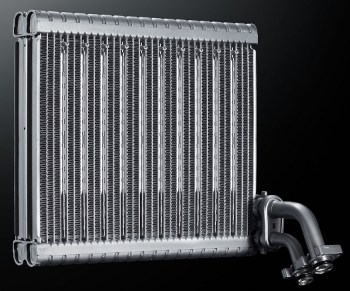 |
| September 25, 2012 | Volume 08 Issue 36 |
Designfax weekly eMagazine
Archives
Partners
Manufacturing Center
Product Spotlight
Modern Applications News
Metalworking Ideas For
Today's Job Shops
Tooling and Production
Strategies for large
metalworking plants
Wheels:
Cold storage evaporator limits rise in cabin temp during idle stop

DENSO Corporation has developed a Cold Storage (CS) Evaporator that limits the increase in vehicle cabin temperature during an idle stop when stop/start technology is employed. The newly developed CS Evaporator is equipped with a cold insulator, located in the heat exchanging area, which stores cold energy to be used to cool in-vehicle cabin air while the engine and air-conditioning cycle is off in the idle-stop state.
The stop-start system, a technology that shuts off a vehicle's engine when stopped in traffic, is now making its way to the U.S. from overseas where such systems are already in common use. More than 8 million cars are expected to have stop-start systems by 2017.
"Air-conditioning systems with our CS Evaporator can limit the increase in cabin temperature when the engine and air-conditioning are off during an idle stop," says Akio Shikamura, senior executive director of DENSO's Thermal Systems Business Group. "This helps maintain occupant comfort while also increasing the vehicle's fuel efficiency."
The evaporator
An evaporator is a component driven by engine power that is used in the air-conditioning cycle. How it works is the cold refrigerant exchanges heat with warm air to send cooled or dehumidified air to the cabin. For conventional air-conditioning systems, when the engine stops during an idle-stop mode, the air-conditioning cycle also stops, which may impact cabin temperature. In order to cool the cabin on higher-temperature days, the engine needs to remain on to continue the air-conditioning cycle, which is not fuel efficient.
DENSO's CS Evaporators
The CS Evaporator has the same basic structure and is the size of a conventional evaporator, but it can store cold energy more quickly and discharge cooled air more slowly. To accomplish this, DENSO installed a closed case with inner fins and a cold insulation inside. The cold insulation case is placed between refrigerant tubes, which the cold insulator directly and efficiently extracts cold energy from during the air-conditioning cycle. When the air-conditioning cycle is stopped, cooled air is slowly released from the cold insulation container via the outer fins connected to the refrigerant tubes. With these functions, storing cold energy can be completed even in a relatively short time of vehicle travel and cooled air can be supplied to the cabin for a long period of time.
This product will be used in the Wagon R, which was launched in Japan on Sept. 6 by Suzuki Motor Corporation. DENSO will progressively make the CS evaporator available for a greater number of vehicle models worldwide.
Source: DENSO
Published September 2012
Rate this article
View our terms of use and privacy policy
